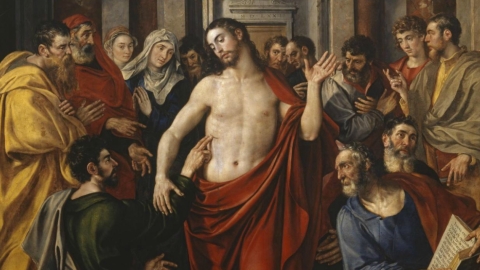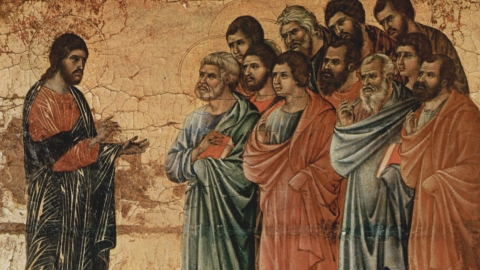At the Service of Vocations

Letter from the Seminary Rector - August 2019
This is a an excellent interview which should be read by every parent, every young man and everyone else.
AT THE SERVICE OF VOCATIONS
Interview with Rev Fr Patrick Troadec
In August, you will leave the position of Rector of the seminary of Flavigny, which yon have occupied since 1996. During this time period, you must have met an impressive number of seminarians and brothers...
“Indeed, during my time as Rector, I received 459 seminarians and brothers, that is, an average of 20 young people per year.
Can you give some details about these candidates to the priesthood and the religions life?
The Flavigny seminary is international, as are all those of the SSPX. Thus, although about three quarters of the seminarians and brothers are French, there are other nationalities, too. The other seminarians came primarily from Switzerland and Italy, but also from other European countries, such as England, Ireland, Scotland. Poland. Spain, and Portugal. I have also received Africans, Americans, and even a young man from Sri Lanka.
Is there a particular kind of family that these vocations come from?
The seminarians come from families that have an average of 6 children. Three quarters of the French seminarians were formed in true Catholic schools, and most of them have their mothers constantly at home.
The Church has always supported large families, and has encouraged the mothers to remain at home. She has also insisted that the children should be formed in profoundly Catholic schools. The analysis of the origin of the candidates to the priesthood and the religious life confirms the soundness of these instructions.
For those candidates who were eventually ordained priests, where do they now exercise their ministry?
Nearly 40% of our priests work abroad, spread over 18 countries. Half of them are in Europe and the rest on the other continents. They are to be found in the United States, Canada, Mexico, Argentina, Gabon, Kenya. South Africa. Zimbabwe, Singapore, Australia and New Zealand. With his Catholic sense, and to ensure the salvation of many souls, Archbishop Lefebvre wanted the SSPX to assist those faithful who asked for the Society's presence, wherever they were located.
Did you see any difference between the young men that you received during these most recent years and those you had formed 20 years ago?
Most seminarians, during their childhood and adolescence, received exceptional graces enabling them to develop the grace of their baptism. They have often been protected from the world. Nevertheless, they are still men of this time, and the world left a mark on some of them.
When I was seminarian. Archbishop Lefebvre said that we were affected by the liberalism which surrounded us. Today, it is the same: the lifestyle of our contemporaries affects us, whether we like it or not.
When I arrived in Flavigny, I spoke about the "fast-food mentality" that affected certain seminarians, i.e. the difficulty they had in understanding difficult subjects. Even back then, it was necessary to express oneself in simple terms to be understood. Eight years afterwards, I noticed what could be called a "channel-hopping tendency", i.e. the inclination not to remain for too long a time on the same subject, a desire for constant change. Nowadays, and for approximately the last eight years, some of our young people have been affected by what I will call the "click era," the desire to have an immediate answer to everything. Farmers know that time must pass between sowing and harvesting, but today's Google users forget this fundamental fact of nature.
Fortunately, the exceptional location and surroundings of the Flavigny seminary help the seminarians to return to reality by living away from the computing world and in an atmosphere favorable to contemplation.
What is the specific characteristic of the first year at the Seminary?
The rule of the Seminary is a product of the wisdom of the Church and is designed to forge balanced personalities. The main purpose of the first year is the search for an intimate union with God. Silence is one of the conditions to achieve this union. Since God speaks in silence, the atmosphere of the seminary is one of silence. Yet, the silence of the Seminary is not a void, or an emptiness, but a fullness. Silence makes it possible to harmonize the advantages of solitude and of life in common.
Another characteristic of the Seminary is the liturgical life. As St. Pius X said, the liturgy is the first source of the Christian spirit. There are specific graces attached to each feast. The seminarians are well disposed to receive these graces.
Another important element for the future priests is the common life. The SSPX is a Society-of common life. The seminarians are led to the practice of virtue by mutual support. Living alongside other young men who are animated by the same ideal is an invaluable help for the seminarians. Likewise, there is a real diversity among the seminarians, which is also a source of enrichment: some are eighteen years old. others are older; some have only gone through high school, others have gone to college; some were born in Tradition, others are converts; there are Frenchmen and foreigners. There is, then, a wide array of seminarians and brothers, and this makes life very pleasant. But we should not idealize seminary life.
There is no mystical life without the ascetical life; there is no union with God without renouncement. To be happy at the Seminary, it is necessary to be generous, to give oneself without reserve. The seminarians must learn to adapt so as to get along with the others, who may be very different from themselves (indeed, if these differences can be a source of enrichment, they can also generate disagreements). Archbishop Lefebvre gave this invaluable advice: "[Seminarians] will strive to show towards all the same esteem and concern, especially during recreations and outings. They will always keep in mind what unites them more than what separates them. [...] Let us not be under any illusions; such happiness is gained through obedience, self-denial, humility, forgetfulness of self, and true zeal for the Our Lord's Kingdom.”
You spoke about converts among the seminarians. Do converts regularly come to the Seminary'? How do they discover us?
Initially, recruitment was done almost exclusively among traditionalists. Now, for about ten years, young men coming from non-traditional circles have also been approaching us.
The majority of them discover us through the internet, and many have first passed through communities which are under the diocesan bishops and which have the Tridentine Mass.
What leads these young people towards us?
In general, the two things which these candidates proffer as reasons for their entrance into the SSPX are "coherence" and "Archbishop Lefebvre." Young people who knock on the door of the Seminary appreciate the doctrinal rigor of the SSPX as well as its liberty to denounce the errors that have infiltrated the Church since Vatican II, and which continue today.9
Moreover, listening to Archbishop Lefebvre's sermons or reading his works, they are overcome by his spirit of faith and by the depth and simplicity of his remarks. They see in him a man of God chosen by Providence to lead souls towards Heaven in the context of this painful crisis that the Church has suffered for the past 50 years.
You spoke about an average of 20 seminarians and brothers entering the seminary every year. The number of the vocations seems to have stagnated, then, because today there are many more pupils in SSPX schools than there were 20 years ago. How do we explain the difficulty of developing vocations?
There are several factors that explain this stagnation. The most important is undoubtedly internet access, which leads souls away from what is essential by locking them up in what is secondary, superficial, transitory and accidental, in what is event-driven, immediate... The invasion of this digital world wreaks havoc in people today. It prevents the development of an interior life. To this difficulty, we can add - alas! - the major problem of impurity: highly inappropriate and even aggressive images in films and advertisements sully so many teenagers and even children. The more one yields to the life of the flesh, the more one cuts himself off from the life of the spirit. St. Paul says rightly that "the sensual man does not perceive the things of God.”
Another major obstacle to the blossoming of vocations is the spirit of criticism. The criticism of priests stifles in the teenager the desire to give himself to God. A child believes and obeys, but a teenager admires and chooses. Constant criticism of priests kills that admiration. The internal difficulties that our Society has suffered have certainly contributed to slowing down the flow of young men into the seminary. Even if that is not quantifiable, it is nonetheless undeniable. The devil is the great divider. We must not enter into his game.
What leads these young people towards us?
In general, the two things which these candidates proffer as reasons for their entrance into the SSPX are "coherence" and "Archbishop Lefebvre." Young people who knock on the door of the Seminary appreciate the doctrinal rigor of the SSPX as well as its liberty to denounce the errors that have infiltrated the Church since Vatican II, and which continue today.9
Moreover, listening to Archbishop Lefebvre's sermons or reading his works, they are overcome by his spirit of faith and by the depth and simplicity of his remarks. They see in him a man of God chosen by Providence to lead souls towards Heaven in the context of this painful crisis that the Church has suffered for the past 50 years.
You spoke about an average of 20 seminarians and brothers entering the seminary every year. The number of the vocations seems to have stagnated, then, because today there are many more pupils in SSPX schools than there were 20 years ago. How do we explain the difficulty of developing vocations?
There are several factors that explain this stagnation. The most important is undoubtedly internet access, which leads souls away from what is essential by locking them up in what is secondary, superficial, transitory and accidental, in what is event-driven, immediate... The invasion of this digital world wreaks havoc in people today. It prevents the development of an interior life. To this difficulty, we can add - alas! - the major problem of impurity: highly inappropriate and even aggressive images in films and advertisements sully so many teenagers and even children. The more one yields to the life of the flesh, the more one cuts himself off from the life of the spirit. St. Paul says rightly that "the sensual man does not perceive the things of God.”
Another major obstacle to the blossoming of vocations is the spirit of criticism. The criticism of priests stifles in the teenager the desire to give himself to God. A child believes and obeys, but a teenager admires and chooses. Constant criticism of priests kills that admiration. The internal difficulties that our Society has suffered have certainly contributed to slowing down the flow of young men into the seminary. Even if that is not quantifiable, it is nonetheless undeniablele. The devil is the great divider. We must not enter into his game.
What advice would you give to parents to support the blossoming of vocations in their homes?
It seems to me that the two essential points to support vocations are summarized in the spirit of piety and of sacrifice.
The spirit of piety arises naturally in the child when he sees that God occupies the first place in his family. When the child notices that the major decisions of his parents are made in the sight of God; when he sees that trials are accepted with a supernatural spirit; when he realizes that his parents think highly of the priestly and religious vocation; when he sees them respecting the priests; when he hears them speak well of them; all of that naturally generates in him a high regard for the priestly vocation.
By breathing in this supernatural fragrance from a young age, the child acquires a supernatural instinct, which greatly facilitates his receptivity to God's call. Of course, prayer in the family helps immensely, as well as pilgrimages, attendance at ordinations, and the daily reading of spiritual books.
It is important that the young men also unite a spirit of sacrifice to this spirit of piety. The parents must communicate the spirit of sacrifice by being firm in face of the whims of their children, and by encouraging them not only to renounce forbidden things, but also what is permissible, in a spirit of atonement for the many sins committed in the world. The lack of the spirit of sacrifice makes man vulnerable and leaves him without any strength, especially faced with the vice of impurity.
Paul Claudel said to his friend Jacques Riviere: "It is said that youth is made for pleasure; actually, it is made for heroism."
Youth is not made for pleasure because pleasure is not an end in itself. As soon as one seeks pleasure for itself, one looks for oneself, one nourishes his own selfishness, seeks to satisfy his ego, and sinks little by little into narcissism. Man is not made to take, but to give; he is made to be given to the Good Shepherd who gave His life for his sheep. Let us develop in our young men the spirit of piety and sacrifice to allow them to resist evil and to find their happiness in God.
Attendance at the Holy Sacrifice of the Mass is the means par excellence to support the spirit of piety and the spirit of sacrifice. Seeing all that Our Lord endured for us in His Passion, seeing Him immolate Himself on our altars, encourages us to follow Him on the path of virtue, which is the way to Heaven.
What would you say to young men in order to help them discern the will of God?
First of all, I would invite them to have a spiritual director. One of the means most suitable to help young men discern the will of God is indeed spiritual direction. It helps them discover the beauty of a life of union with God and it helps them set up a strategy to fight against the "old man."
I would also encourage young men to participate in a good youth movement, which will help them develop selflessness and missionary zeal.
Lastly, I would advise them to make a spiritual retreat at least every two years. The framework of a retreat supports the development of the interior life and puts us in the most favorable conditions to hear the voice of God.
You are leaving the seminary to go into a priory. That will he a big change for you!
Yes, it is true. I will be in a position similar to what I knew before coming to Flavigny. Yet, the SSPX has the priesthood and all that belongs to it as her primary mission, and so in the priory of Brest. I will transmit to families and children the foundations that will make it possible for vocations to flourish among the young. My next mission will therefore remain turned towards the priesthood and what is its raison d'etre, the Holy Sacrifice of the Mass, from which we receive all the graces of redemption.





